Factors Influencing Student Academic Performance: A Research Analysis
VerifiedAdded on 2023/06/04
|8
|2231
|81
Report
AI Summary
This report presents a comprehensive analysis of research articles focusing on the factors that influence student academic performance, particularly within the context of nursing education. The study synthesizes findings from three journal articles (J16, J17, and J18) that employed quantitative research methodologies to identify key determinants of academic success. The literature review highlights four major categories of influence: school-related factors (classroom environment, resources), teacher-related factors (qualifications, teaching approaches), student-related factors (skills, study habits), and family factors (stress, income, parental education). The methodology sections detail the quantitative approaches, including survey questionnaires and Likert scales, used across the studies, as well as the populations and limitations. The results section compares the findings of the three articles, highlighting the most significant factors influencing academic performance. The report concludes by recommending further research, including systematic reviews and randomized control trials, to refine the understanding of these factors and develop effective strategies to improve student outcomes. The report emphasizes the importance of addressing school, teacher, and student-related factors to enhance academic performance and promote student success in higher education.
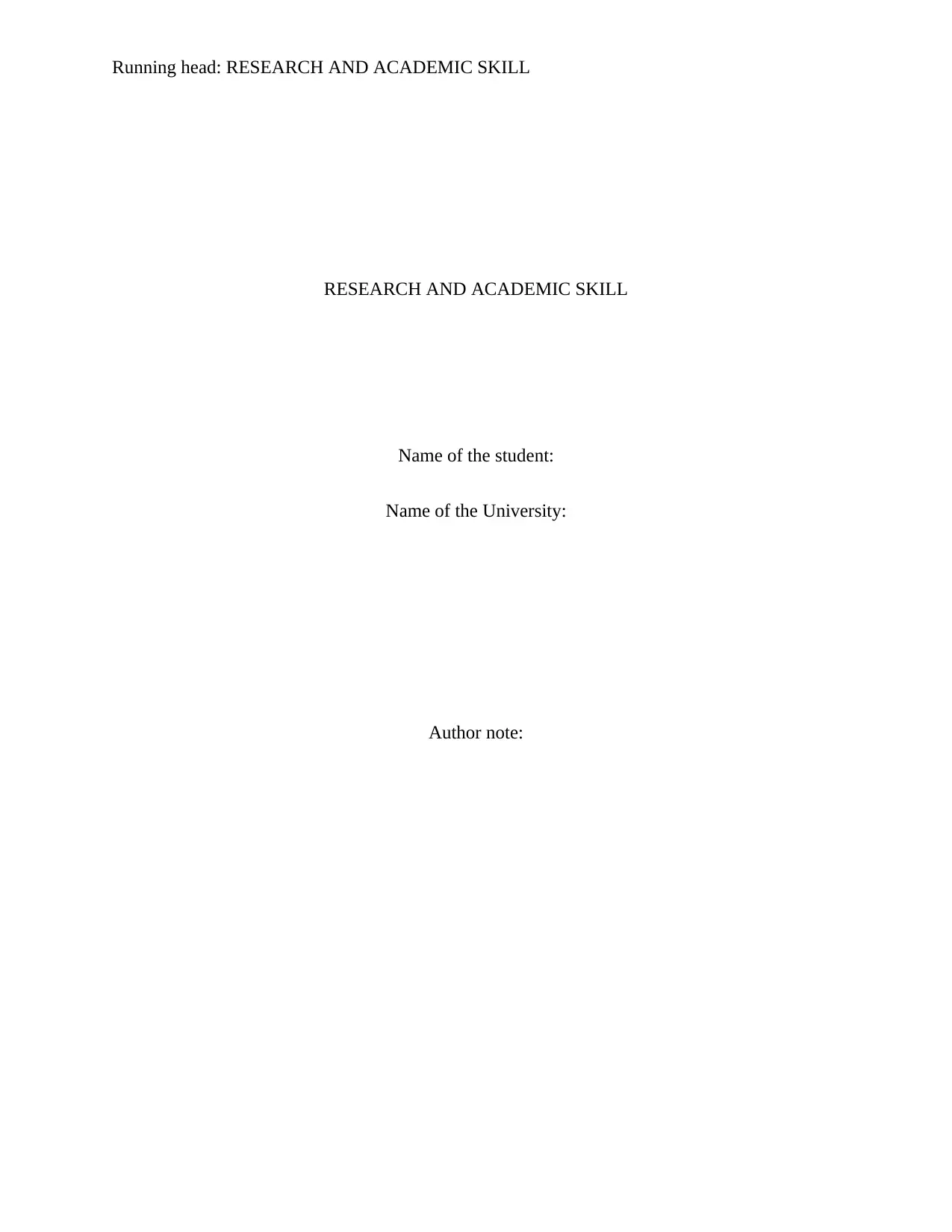
Running head: RESEARCH AND ACADEMIC SKILL
RESEARCH AND ACADEMIC SKILL
Name of the student:
Name of the University:
Author note:
RESEARCH AND ACADEMIC SKILL
Name of the student:
Name of the University:
Author note:
Paraphrase This Document
Need a fresh take? Get an instant paraphrase of this document with our AI Paraphraser
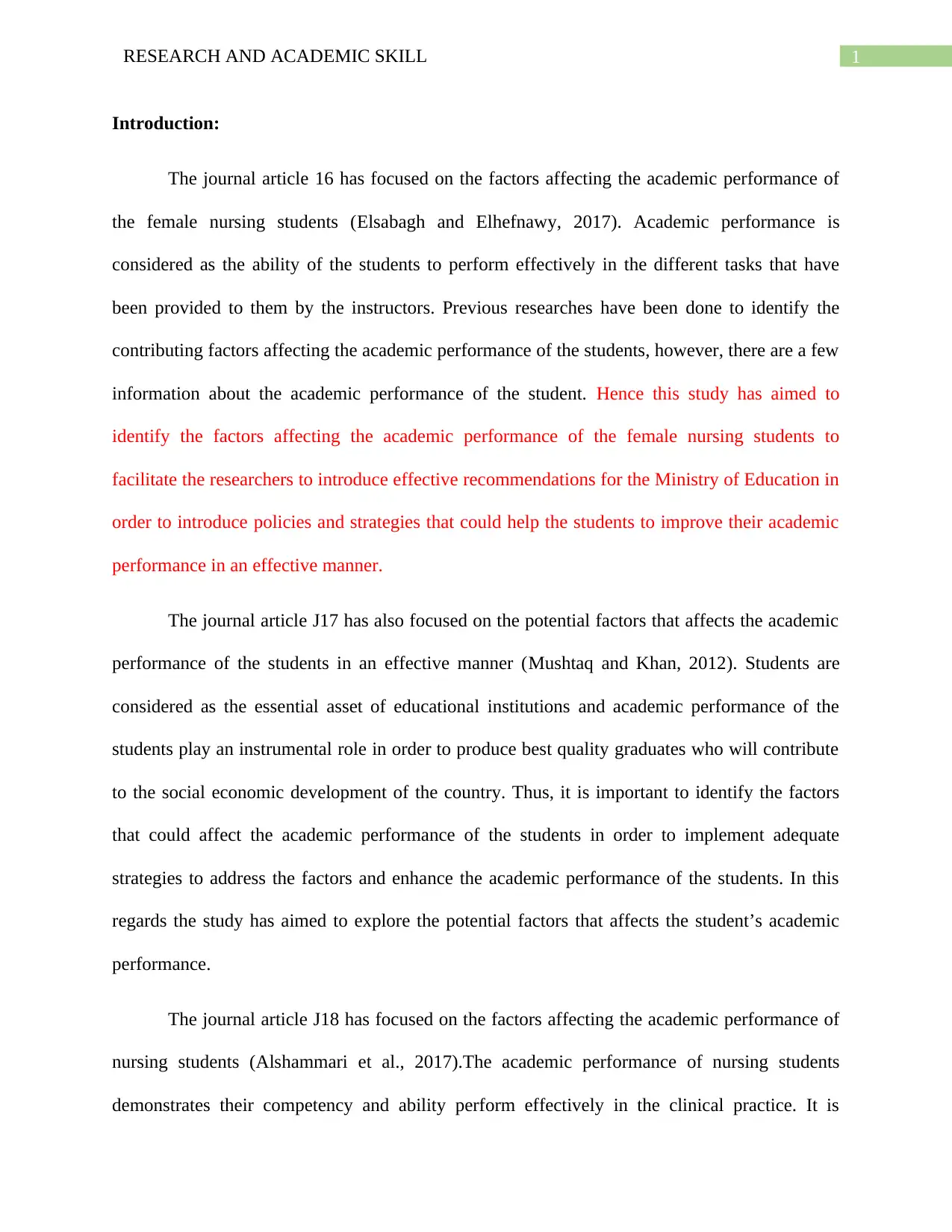
1RESEARCH AND ACADEMIC SKILL
Introduction:
The journal article 16 has focused on the factors affecting the academic performance of
the female nursing students (Elsabagh and Elhefnawy, 2017). Academic performance is
considered as the ability of the students to perform effectively in the different tasks that have
been provided to them by the instructors. Previous researches have been done to identify the
contributing factors affecting the academic performance of the students, however, there are a few
information about the academic performance of the student. Hence this study has aimed to
identify the factors affecting the academic performance of the female nursing students to
facilitate the researchers to introduce effective recommendations for the Ministry of Education in
order to introduce policies and strategies that could help the students to improve their academic
performance in an effective manner.
The journal article J17 has also focused on the potential factors that affects the academic
performance of the students in an effective manner (Mushtaq and Khan, 2012). Students are
considered as the essential asset of educational institutions and academic performance of the
students play an instrumental role in order to produce best quality graduates who will contribute
to the social economic development of the country. Thus, it is important to identify the factors
that could affect the academic performance of the students in order to implement adequate
strategies to address the factors and enhance the academic performance of the students. In this
regards the study has aimed to explore the potential factors that affects the student’s academic
performance.
The journal article J18 has focused on the factors affecting the academic performance of
nursing students (Alshammari et al., 2017).The academic performance of nursing students
demonstrates their competency and ability perform effectively in the clinical practice. It is
Introduction:
The journal article 16 has focused on the factors affecting the academic performance of
the female nursing students (Elsabagh and Elhefnawy, 2017). Academic performance is
considered as the ability of the students to perform effectively in the different tasks that have
been provided to them by the instructors. Previous researches have been done to identify the
contributing factors affecting the academic performance of the students, however, there are a few
information about the academic performance of the student. Hence this study has aimed to
identify the factors affecting the academic performance of the female nursing students to
facilitate the researchers to introduce effective recommendations for the Ministry of Education in
order to introduce policies and strategies that could help the students to improve their academic
performance in an effective manner.
The journal article J17 has also focused on the potential factors that affects the academic
performance of the students in an effective manner (Mushtaq and Khan, 2012). Students are
considered as the essential asset of educational institutions and academic performance of the
students play an instrumental role in order to produce best quality graduates who will contribute
to the social economic development of the country. Thus, it is important to identify the factors
that could affect the academic performance of the students in order to implement adequate
strategies to address the factors and enhance the academic performance of the students. In this
regards the study has aimed to explore the potential factors that affects the student’s academic
performance.
The journal article J18 has focused on the factors affecting the academic performance of
nursing students (Alshammari et al., 2017).The academic performance of nursing students
demonstrates their competency and ability perform effectively in the clinical practice. It is
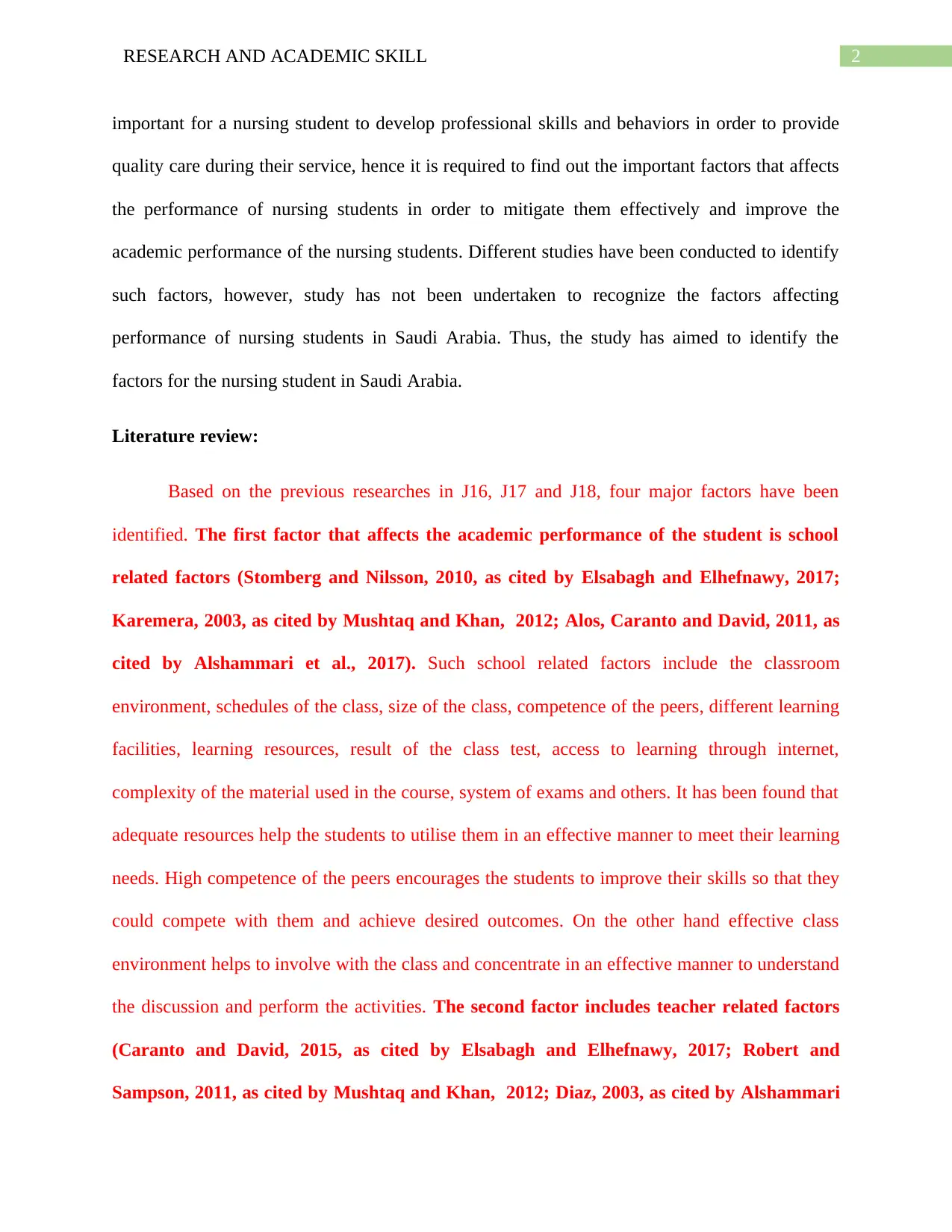
2RESEARCH AND ACADEMIC SKILL
important for a nursing student to develop professional skills and behaviors in order to provide
quality care during their service, hence it is required to find out the important factors that affects
the performance of nursing students in order to mitigate them effectively and improve the
academic performance of the nursing students. Different studies have been conducted to identify
such factors, however, study has not been undertaken to recognize the factors affecting
performance of nursing students in Saudi Arabia. Thus, the study has aimed to identify the
factors for the nursing student in Saudi Arabia.
Literature review:
Based on the previous researches in J16, J17 and J18, four major factors have been
identified. The first factor that affects the academic performance of the student is school
related factors (Stomberg and Nilsson, 2010, as cited by Elsabagh and Elhefnawy, 2017;
Karemera, 2003, as cited by Mushtaq and Khan, 2012; Alos, Caranto and David, 2011, as
cited by Alshammari et al., 2017). Such school related factors include the classroom
environment, schedules of the class, size of the class, competence of the peers, different learning
facilities, learning resources, result of the class test, access to learning through internet,
complexity of the material used in the course, system of exams and others. It has been found that
adequate resources help the students to utilise them in an effective manner to meet their learning
needs. High competence of the peers encourages the students to improve their skills so that they
could compete with them and achieve desired outcomes. On the other hand effective class
environment helps to involve with the class and concentrate in an effective manner to understand
the discussion and perform the activities. The second factor includes teacher related factors
(Caranto and David, 2015, as cited by Elsabagh and Elhefnawy, 2017; Robert and
Sampson, 2011, as cited by Mushtaq and Khan, 2012; Diaz, 2003, as cited by Alshammari
important for a nursing student to develop professional skills and behaviors in order to provide
quality care during their service, hence it is required to find out the important factors that affects
the performance of nursing students in order to mitigate them effectively and improve the
academic performance of the nursing students. Different studies have been conducted to identify
such factors, however, study has not been undertaken to recognize the factors affecting
performance of nursing students in Saudi Arabia. Thus, the study has aimed to identify the
factors for the nursing student in Saudi Arabia.
Literature review:
Based on the previous researches in J16, J17 and J18, four major factors have been
identified. The first factor that affects the academic performance of the student is school
related factors (Stomberg and Nilsson, 2010, as cited by Elsabagh and Elhefnawy, 2017;
Karemera, 2003, as cited by Mushtaq and Khan, 2012; Alos, Caranto and David, 2011, as
cited by Alshammari et al., 2017). Such school related factors include the classroom
environment, schedules of the class, size of the class, competence of the peers, different learning
facilities, learning resources, result of the class test, access to learning through internet,
complexity of the material used in the course, system of exams and others. It has been found that
adequate resources help the students to utilise them in an effective manner to meet their learning
needs. High competence of the peers encourages the students to improve their skills so that they
could compete with them and achieve desired outcomes. On the other hand effective class
environment helps to involve with the class and concentrate in an effective manner to understand
the discussion and perform the activities. The second factor includes teacher related factors
(Caranto and David, 2015, as cited by Elsabagh and Elhefnawy, 2017; Robert and
Sampson, 2011, as cited by Mushtaq and Khan, 2012; Diaz, 2003, as cited by Alshammari
⊘ This is a preview!⊘
Do you want full access?
Subscribe today to unlock all pages.

Trusted by 1+ million students worldwide
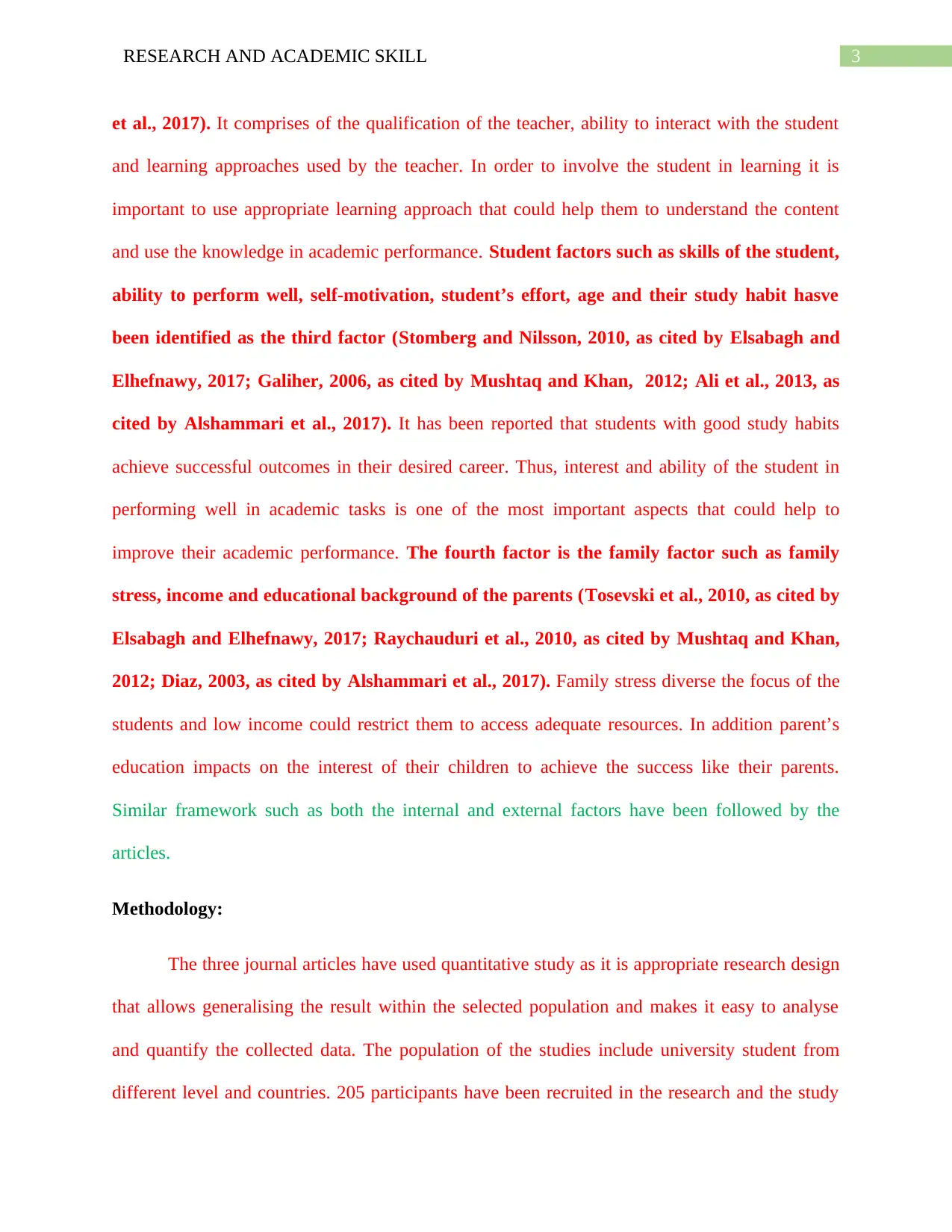
3RESEARCH AND ACADEMIC SKILL
et al., 2017). It comprises of the qualification of the teacher, ability to interact with the student
and learning approaches used by the teacher. In order to involve the student in learning it is
important to use appropriate learning approach that could help them to understand the content
and use the knowledge in academic performance. Student factors such as skills of the student,
ability to perform well, self-motivation, student’s effort, age and their study habit hasve
been identified as the third factor (Stomberg and Nilsson, 2010, as cited by Elsabagh and
Elhefnawy, 2017; Galiher, 2006, as cited by Mushtaq and Khan, 2012; Ali et al., 2013, as
cited by Alshammari et al., 2017). It has been reported that students with good study habits
achieve successful outcomes in their desired career. Thus, interest and ability of the student in
performing well in academic tasks is one of the most important aspects that could help to
improve their academic performance. The fourth factor is the family factor such as family
stress, income and educational background of the parents (Tosevski et al., 2010, as cited by
Elsabagh and Elhefnawy, 2017; Raychauduri et al., 2010, as cited by Mushtaq and Khan,
2012; Diaz, 2003, as cited by Alshammari et al., 2017). Family stress diverse the focus of the
students and low income could restrict them to access adequate resources. In addition parent’s
education impacts on the interest of their children to achieve the success like their parents.
Similar framework such as both the internal and external factors have been followed by the
articles.
Methodology:
The three journal articles have used quantitative study as it is appropriate research design
that allows generalising the result within the selected population and makes it easy to analyse
and quantify the collected data. The population of the studies include university student from
different level and countries. 205 participants have been recruited in the research and the study
et al., 2017). It comprises of the qualification of the teacher, ability to interact with the student
and learning approaches used by the teacher. In order to involve the student in learning it is
important to use appropriate learning approach that could help them to understand the content
and use the knowledge in academic performance. Student factors such as skills of the student,
ability to perform well, self-motivation, student’s effort, age and their study habit hasve
been identified as the third factor (Stomberg and Nilsson, 2010, as cited by Elsabagh and
Elhefnawy, 2017; Galiher, 2006, as cited by Mushtaq and Khan, 2012; Ali et al., 2013, as
cited by Alshammari et al., 2017). It has been reported that students with good study habits
achieve successful outcomes in their desired career. Thus, interest and ability of the student in
performing well in academic tasks is one of the most important aspects that could help to
improve their academic performance. The fourth factor is the family factor such as family
stress, income and educational background of the parents (Tosevski et al., 2010, as cited by
Elsabagh and Elhefnawy, 2017; Raychauduri et al., 2010, as cited by Mushtaq and Khan,
2012; Diaz, 2003, as cited by Alshammari et al., 2017). Family stress diverse the focus of the
students and low income could restrict them to access adequate resources. In addition parent’s
education impacts on the interest of their children to achieve the success like their parents.
Similar framework such as both the internal and external factors have been followed by the
articles.
Methodology:
The three journal articles have used quantitative study as it is appropriate research design
that allows generalising the result within the selected population and makes it easy to analyse
and quantify the collected data. The population of the studies include university student from
different level and countries. 205 participants have been recruited in the research and the study
Paraphrase This Document
Need a fresh take? Get an instant paraphrase of this document with our AI Paraphraser
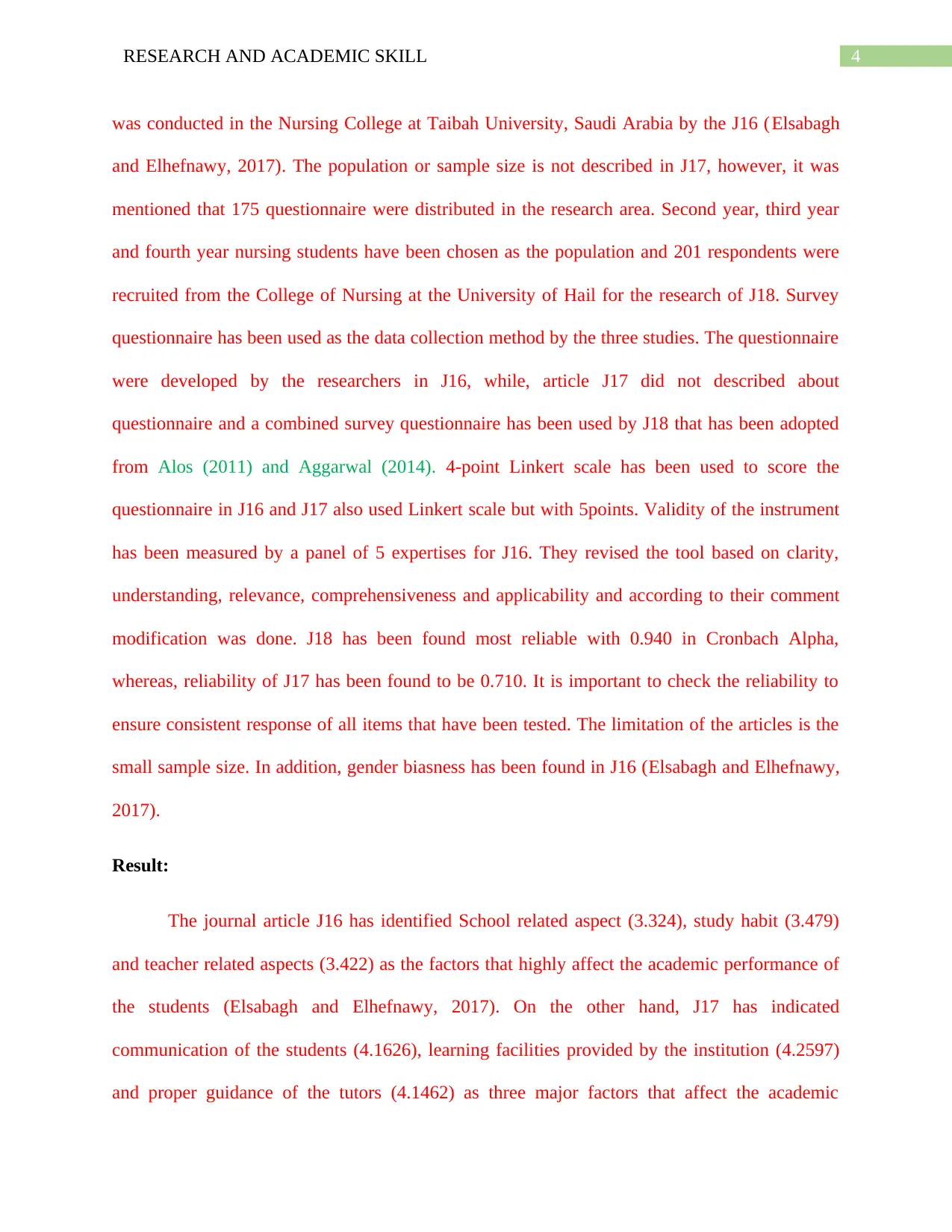
4RESEARCH AND ACADEMIC SKILL
was conducted in the Nursing College at Taibah University, Saudi Arabia by the J16 (Elsabagh
and Elhefnawy, 2017). The population or sample size is not described in J17, however, it was
mentioned that 175 questionnaire were distributed in the research area. Second year, third year
and fourth year nursing students have been chosen as the population and 201 respondents were
recruited from the College of Nursing at the University of Hail for the research of J18. Survey
questionnaire has been used as the data collection method by the three studies. The questionnaire
were developed by the researchers in J16, while, article J17 did not described about
questionnaire and a combined survey questionnaire has been used by J18 that has been adopted
from Alos (2011) and Aggarwal (2014). 4-point Linkert scale has been used to score the
questionnaire in J16 and J17 also used Linkert scale but with 5points. Validity of the instrument
has been measured by a panel of 5 expertises for J16. They revised the tool based on clarity,
understanding, relevance, comprehensiveness and applicability and according to their comment
modification was done. J18 has been found most reliable with 0.940 in Cronbach Alpha,
whereas, reliability of J17 has been found to be 0.710. It is important to check the reliability to
ensure consistent response of all items that have been tested. The limitation of the articles is the
small sample size. In addition, gender biasness has been found in J16 (Elsabagh and Elhefnawy,
2017).
Result:
The journal article J16 has identified School related aspect (3.324), study habit (3.479)
and teacher related aspects (3.422) as the factors that highly affect the academic performance of
the students (Elsabagh and Elhefnawy, 2017). On the other hand, J17 has indicated
communication of the students (4.1626), learning facilities provided by the institution (4.2597)
and proper guidance of the tutors (4.1462) as three major factors that affect the academic
was conducted in the Nursing College at Taibah University, Saudi Arabia by the J16 (Elsabagh
and Elhefnawy, 2017). The population or sample size is not described in J17, however, it was
mentioned that 175 questionnaire were distributed in the research area. Second year, third year
and fourth year nursing students have been chosen as the population and 201 respondents were
recruited from the College of Nursing at the University of Hail for the research of J18. Survey
questionnaire has been used as the data collection method by the three studies. The questionnaire
were developed by the researchers in J16, while, article J17 did not described about
questionnaire and a combined survey questionnaire has been used by J18 that has been adopted
from Alos (2011) and Aggarwal (2014). 4-point Linkert scale has been used to score the
questionnaire in J16 and J17 also used Linkert scale but with 5points. Validity of the instrument
has been measured by a panel of 5 expertises for J16. They revised the tool based on clarity,
understanding, relevance, comprehensiveness and applicability and according to their comment
modification was done. J18 has been found most reliable with 0.940 in Cronbach Alpha,
whereas, reliability of J17 has been found to be 0.710. It is important to check the reliability to
ensure consistent response of all items that have been tested. The limitation of the articles is the
small sample size. In addition, gender biasness has been found in J16 (Elsabagh and Elhefnawy,
2017).
Result:
The journal article J16 has identified School related aspect (3.324), study habit (3.479)
and teacher related aspects (3.422) as the factors that highly affect the academic performance of
the students (Elsabagh and Elhefnawy, 2017). On the other hand, J17 has indicated
communication of the students (4.1626), learning facilities provided by the institution (4.2597)
and proper guidance of the tutors (4.1462) as three major factors that affect the academic
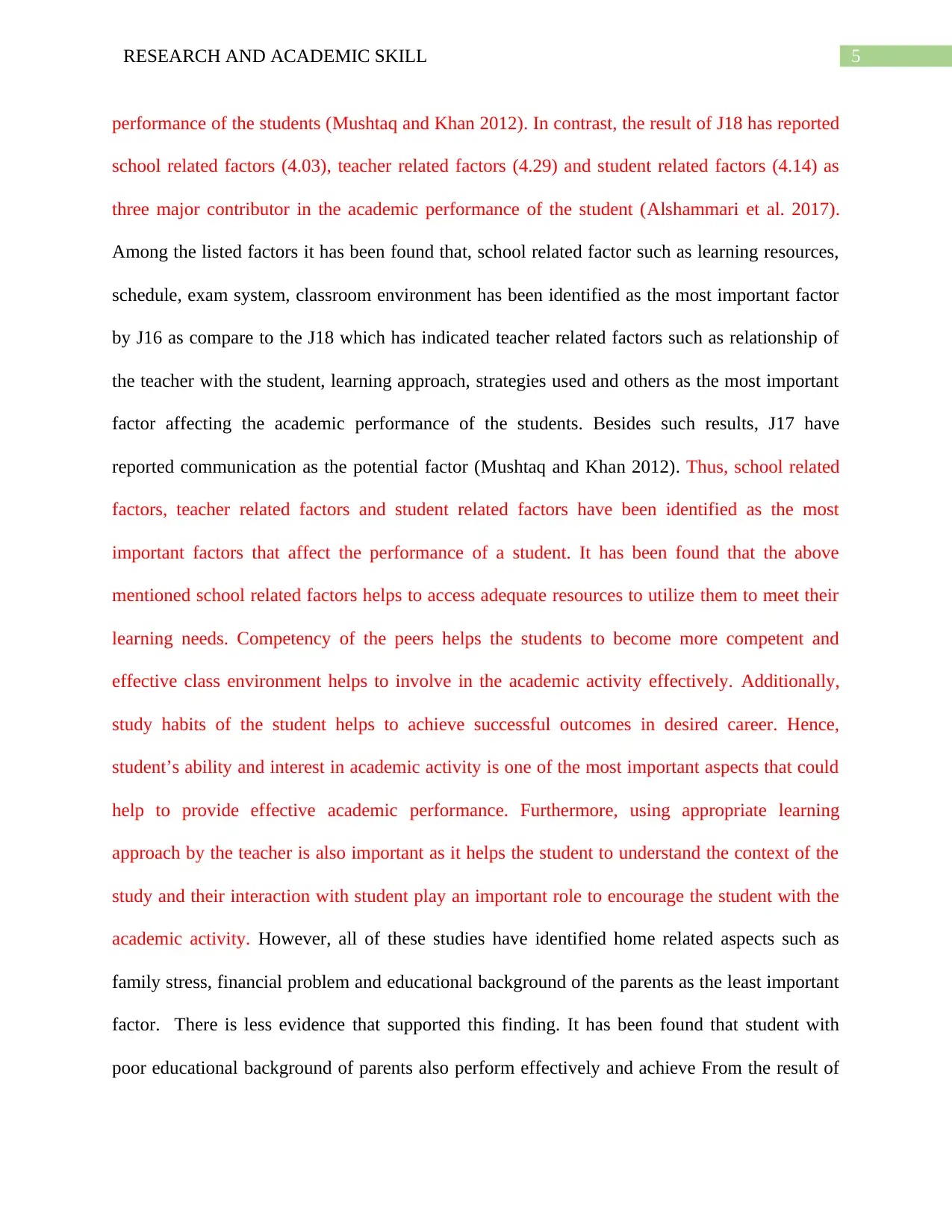
5RESEARCH AND ACADEMIC SKILL
performance of the students (Mushtaq and Khan 2012). In contrast, the result of J18 has reported
school related factors (4.03), teacher related factors (4.29) and student related factors (4.14) as
three major contributor in the academic performance of the student (Alshammari et al. 2017).
Among the listed factors it has been found that, school related factor such as learning resources,
schedule, exam system, classroom environment has been identified as the most important factor
by J16 as compare to the J18 which has indicated teacher related factors such as relationship of
the teacher with the student, learning approach, strategies used and others as the most important
factor affecting the academic performance of the students. Besides such results, J17 have
reported communication as the potential factor (Mushtaq and Khan 2012). Thus, school related
factors, teacher related factors and student related factors have been identified as the most
important factors that affect the performance of a student. It has been found that the above
mentioned school related factors helps to access adequate resources to utilize them to meet their
learning needs. Competency of the peers helps the students to become more competent and
effective class environment helps to involve in the academic activity effectively. Additionally,
study habits of the student helps to achieve successful outcomes in desired career. Hence,
student’s ability and interest in academic activity is one of the most important aspects that could
help to provide effective academic performance. Furthermore, using appropriate learning
approach by the teacher is also important as it helps the student to understand the context of the
study and their interaction with student play an important role to encourage the student with the
academic activity. However, all of these studies have identified home related aspects such as
family stress, financial problem and educational background of the parents as the least important
factor. There is less evidence that supported this finding. It has been found that student with
poor educational background of parents also perform effectively and achieve From the result of
performance of the students (Mushtaq and Khan 2012). In contrast, the result of J18 has reported
school related factors (4.03), teacher related factors (4.29) and student related factors (4.14) as
three major contributor in the academic performance of the student (Alshammari et al. 2017).
Among the listed factors it has been found that, school related factor such as learning resources,
schedule, exam system, classroom environment has been identified as the most important factor
by J16 as compare to the J18 which has indicated teacher related factors such as relationship of
the teacher with the student, learning approach, strategies used and others as the most important
factor affecting the academic performance of the students. Besides such results, J17 have
reported communication as the potential factor (Mushtaq and Khan 2012). Thus, school related
factors, teacher related factors and student related factors have been identified as the most
important factors that affect the performance of a student. It has been found that the above
mentioned school related factors helps to access adequate resources to utilize them to meet their
learning needs. Competency of the peers helps the students to become more competent and
effective class environment helps to involve in the academic activity effectively. Additionally,
study habits of the student helps to achieve successful outcomes in desired career. Hence,
student’s ability and interest in academic activity is one of the most important aspects that could
help to provide effective academic performance. Furthermore, using appropriate learning
approach by the teacher is also important as it helps the student to understand the context of the
study and their interaction with student play an important role to encourage the student with the
academic activity. However, all of these studies have identified home related aspects such as
family stress, financial problem and educational background of the parents as the least important
factor. There is less evidence that supported this finding. It has been found that student with
poor educational background of parents also perform effectively and achieve From the result of
⊘ This is a preview!⊘
Do you want full access?
Subscribe today to unlock all pages.

Trusted by 1+ million students worldwide
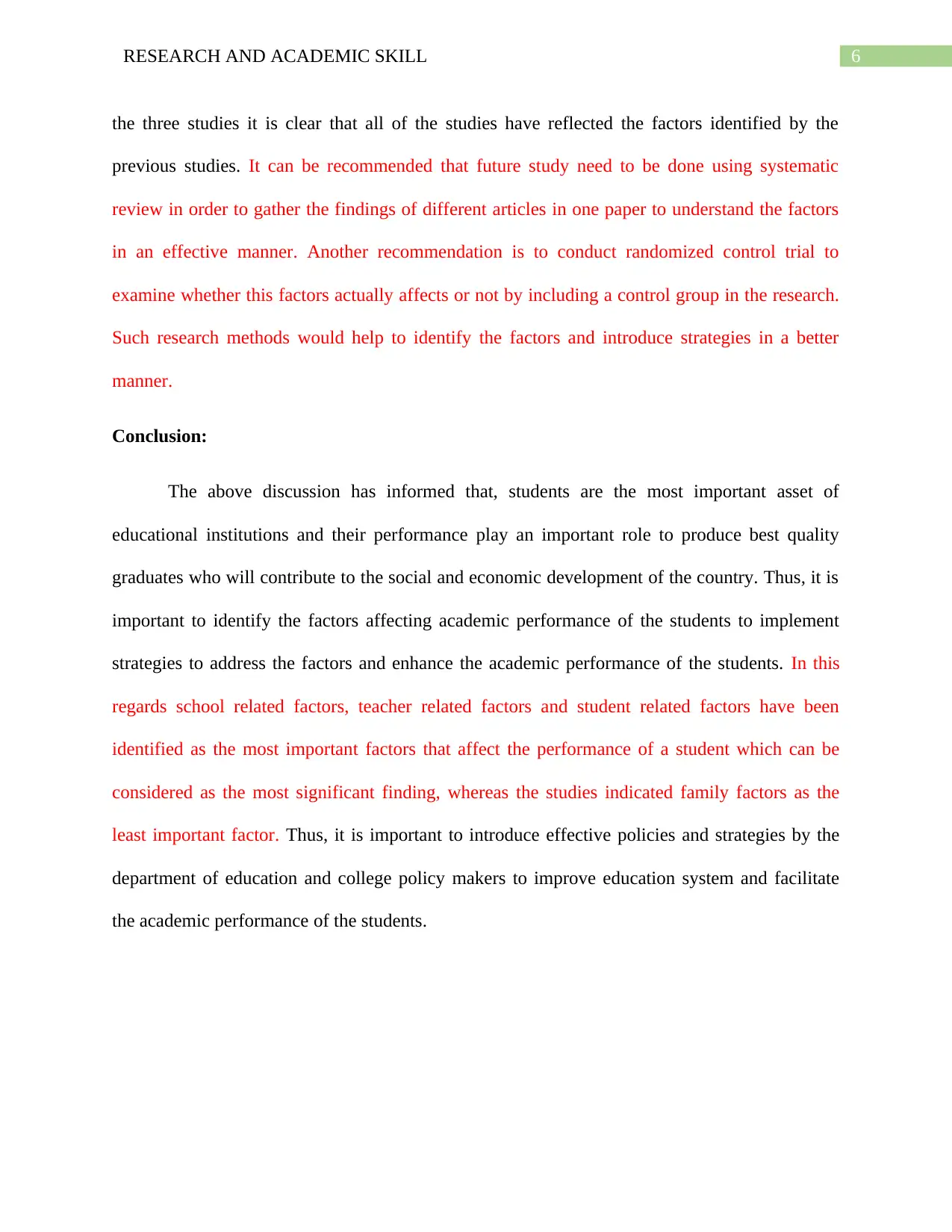
6RESEARCH AND ACADEMIC SKILL
the three studies it is clear that all of the studies have reflected the factors identified by the
previous studies. It can be recommended that future study need to be done using systematic
review in order to gather the findings of different articles in one paper to understand the factors
in an effective manner. Another recommendation is to conduct randomized control trial to
examine whether this factors actually affects or not by including a control group in the research.
Such research methods would help to identify the factors and introduce strategies in a better
manner.
Conclusion:
The above discussion has informed that, students are the most important asset of
educational institutions and their performance play an important role to produce best quality
graduates who will contribute to the social and economic development of the country. Thus, it is
important to identify the factors affecting academic performance of the students to implement
strategies to address the factors and enhance the academic performance of the students. In this
regards school related factors, teacher related factors and student related factors have been
identified as the most important factors that affect the performance of a student which can be
considered as the most significant finding, whereas the studies indicated family factors as the
least important factor. Thus, it is important to introduce effective policies and strategies by the
department of education and college policy makers to improve education system and facilitate
the academic performance of the students.
the three studies it is clear that all of the studies have reflected the factors identified by the
previous studies. It can be recommended that future study need to be done using systematic
review in order to gather the findings of different articles in one paper to understand the factors
in an effective manner. Another recommendation is to conduct randomized control trial to
examine whether this factors actually affects or not by including a control group in the research.
Such research methods would help to identify the factors and introduce strategies in a better
manner.
Conclusion:
The above discussion has informed that, students are the most important asset of
educational institutions and their performance play an important role to produce best quality
graduates who will contribute to the social and economic development of the country. Thus, it is
important to identify the factors affecting academic performance of the students to implement
strategies to address the factors and enhance the academic performance of the students. In this
regards school related factors, teacher related factors and student related factors have been
identified as the most important factors that affect the performance of a student which can be
considered as the most significant finding, whereas the studies indicated family factors as the
least important factor. Thus, it is important to introduce effective policies and strategies by the
department of education and college policy makers to improve education system and facilitate
the academic performance of the students.
Paraphrase This Document
Need a fresh take? Get an instant paraphrase of this document with our AI Paraphraser
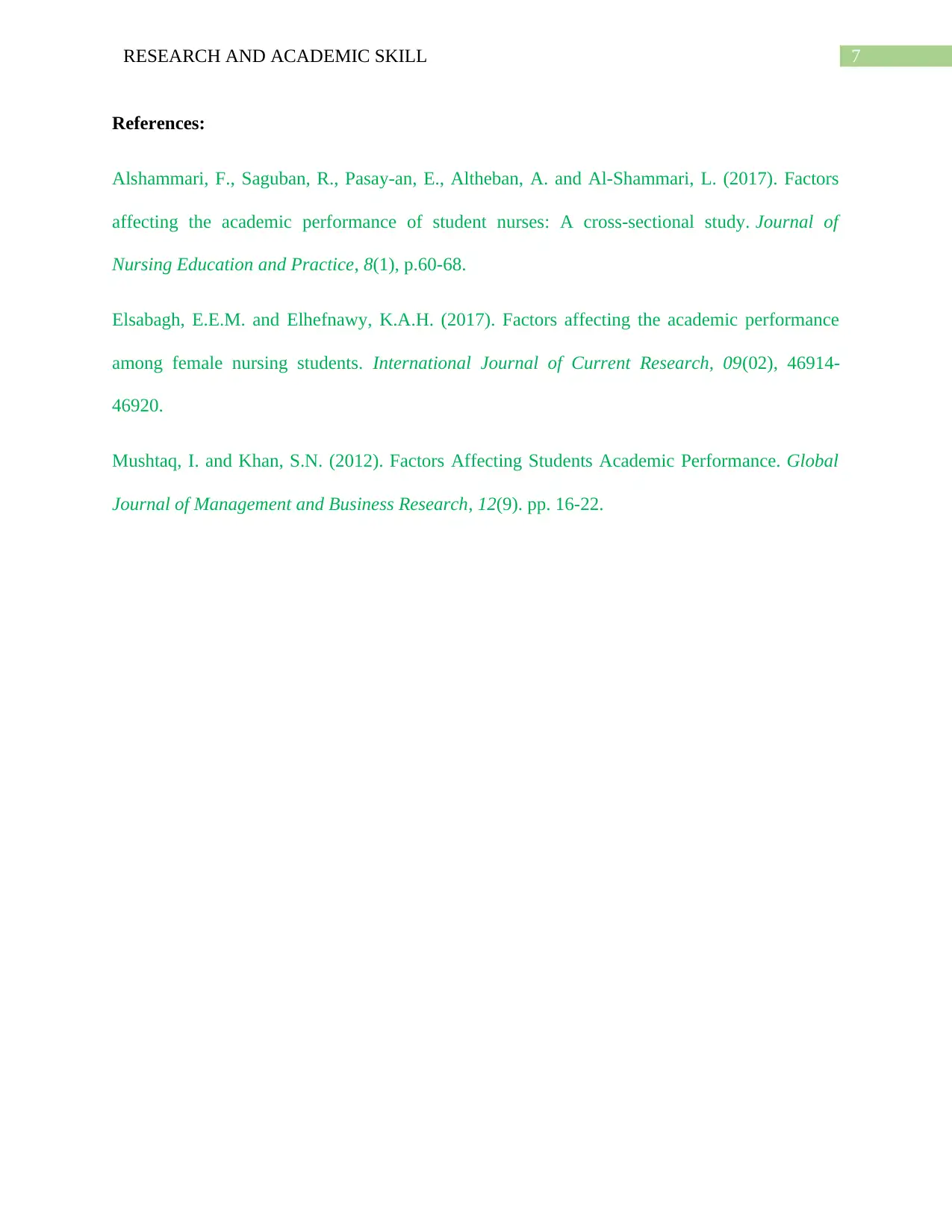
7RESEARCH AND ACADEMIC SKILL
References:
Alshammari, F., Saguban, R., Pasay-an, E., Altheban, A. and Al-Shammari, L. (2017). Factors
affecting the academic performance of student nurses: A cross-sectional study. Journal of
Nursing Education and Practice, 8(1), p.60-68.
Elsabagh, E.E.M. and Elhefnawy, K.A.H. (2017). Factors affecting the academic performance
among female nursing students. International Journal of Current Research, 09(02), 46914-
46920.
Mushtaq, I. and Khan, S.N. (2012). Factors Affecting Students Academic Performance. Global
Journal of Management and Business Research, 12(9). pp. 16-22.
References:
Alshammari, F., Saguban, R., Pasay-an, E., Altheban, A. and Al-Shammari, L. (2017). Factors
affecting the academic performance of student nurses: A cross-sectional study. Journal of
Nursing Education and Practice, 8(1), p.60-68.
Elsabagh, E.E.M. and Elhefnawy, K.A.H. (2017). Factors affecting the academic performance
among female nursing students. International Journal of Current Research, 09(02), 46914-
46920.
Mushtaq, I. and Khan, S.N. (2012). Factors Affecting Students Academic Performance. Global
Journal of Management and Business Research, 12(9). pp. 16-22.
1 out of 8
Related Documents
Your All-in-One AI-Powered Toolkit for Academic Success.
+13062052269
info@desklib.com
Available 24*7 on WhatsApp / Email
![[object Object]](/_next/static/media/star-bottom.7253800d.svg)
Unlock your academic potential
Copyright © 2020–2026 A2Z Services. All Rights Reserved. Developed and managed by ZUCOL.




